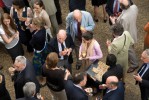INTERNATIONAL YEAR OF CHEMISTRYBREAKFAST MEETING 18th Jan 2011, Fourah Bay CollegeUniversityof Sierra Leone, FREETOWN, SIERRA LEONETo launch IYC 2011, the female scientists at the University of Sierra Leone shared a chemical moment in time with other female scientists in Port Harcourt, Nigeria and the University of Cambridge, UK.
Lectures were given by
Dr Ronnie Williams, a Senior Lecturer at the Department of Chemistry,
University of Sierra Leone where he shared his enthusiasm in chemistry by illustrating his day-to-day activities from teaching/lecturing to research.
Ms Fatmata Kaiwa, a Senior Lecturer and Acting Head of the Department of Biological Sciences,
University of Sierra Leone, demonstrated her enthusiasm for chemistry by highlighting several projects she has been involved with and how chemistry underpins them.
Professor Sahr Gbamanja, Dean of Post Graduate Studies,
University of Sierra Leone, contributed to the discussion by presenting a paper entitled ‘Improving Science Education in Sierra Leone’. He began with a brief history of Higher Education in Sierra Leone. He also discussed the great work being carried out by the government in encouraging young people to persue careers in science by the provision of scholarships. He outlined the work being done by Mathematics and Science Teachers (SLAMAST) in collaboration with the Ministry of Education, Science and Technology to provide workshops aimed at training and retraining Science teachers. SLAMAST can carry out this work thanks to sponsorships recieved from the
Japan International Cooperation Agency (JICA).
The meeting was further enhanced with students performing various chemistry experiments to mark the event.
More information about the event can be viewed
here.
more...
